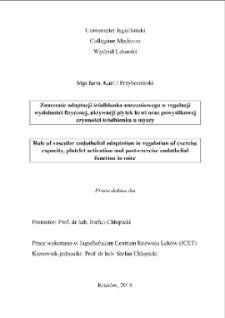Object
Title: Role of vascular endothelial adaptation in regulation of exercise capacity, platelet activation and post-exercise endothelial function in mice
Abstract:
By the production of nitric oxide (NO) and prostacyclin (PGI2), the vascular endothelium contributes to the regulation of exercise capacity and counteracts exercise-induced platelet activation. In turn, endothelial dysfunction may result in impairment of exercise capacity and an increased risk of thrombotic events due to excessive platelet activation during intense exercise.The aim of the studies was to uncover endothelial adaptive mechanisms regulating exercise capacity, platelet activation and post-exercise endothelial function in mice. Especially, the research was focused on differences in endothelial response to a single bout of acute exercise in healthy mice and in mice with impaired NO function.PhD thesis consists of 3 published research papers. Papers included in PhD dissertation show that in some circumstances endothelial dysfunction linked to reduced NO bioavailability is not necessarily associated with impairment of exercise capacity and platelet activation in response to a single bout of intense exercise. In case of impaired NO-dependent function, increased or preserved PGI2 activity may be a compensatory mechanism, which affords exercise tolerance and protection against excessive platelet activation and thrombotic events during or after intense exercise. Obtained results suggest that pharmacological enhancement of PGI2-dependent mechanisms could be valuable approach ; for protection against the harmful effects of intense exercise in diseases with reduced NO bioavailability and high pro thrombotic risk.
Place of publishing:
Level of degree:
Degree discipline:
Degree grantor:
Promoter:
Date issued:
Identifier:
Call number:
Language:
Access rights:
Object collections:
Last modified:
Mar 13, 2023
In our library since:
Apr 22, 2021
Number of object content hits:
11
Number of object content views in PDF format
0
All available object's versions:
http://dl.cm-uj.krakow.pl:8080/publication/4423
Show description in RDF format:
Show description in OAI-PMH format:
| Edition name | Date |
|---|---|
| ZB-130322 | Mar 13, 2023 |
Objects
Similar
Przyborowski, Kamil
Drelicharz, Łukasz
Bartuś, Magdalena
Gwóźdź, Paweł
Wnuk, Mateusz
Kosiniak-Kamysz, Władysław
Dyszkiewicz-Korpanty, Anna
Włoch, Alicja

